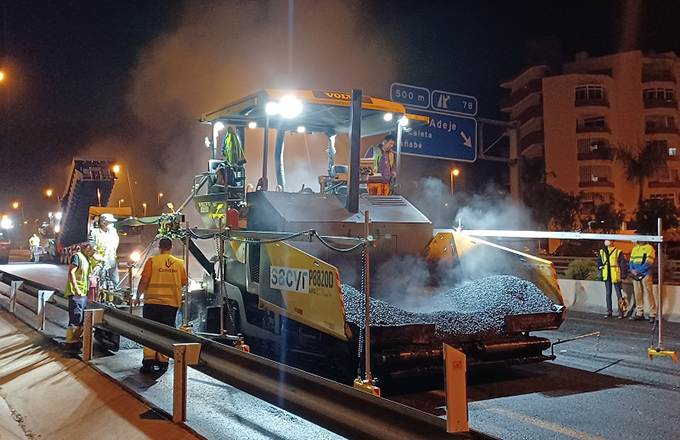The Canary Islands are a fragmented territory with complex terrain, and 42% of this area is protected by environmental regulations. As a result, the islands present major limitations in terms of obtaining the raw materials required for major civil engineering projects. Aggregates are one of the materials that are hard to obtain here. Tenerife, for example, only has one quarry authorized to extract aggregates.
The island’s Council (Cabildo) has shown its concern for this problem and is looking for more sustainable solutions, not just to reduce the use of natural resources, but also the waste generated in such projects.
In 2021, the Council launched a tender competition for the resurfacing of the TF-1 and TF-5 highways, promoting and encouraging the reuse of material extracted when digging up the highway, indicating up to 50% usage of RAP (Reclaimed Asphalt Pavement) according to the Highway Instruction R.D. 40/2017.
Sacyr, in line with our policy of sustainability and innovation, obtained the best technical score in the tender and put into operation its hot in-place recycling for the resurfacing of the TF-1 Highway.
The TF-1 is a high-capacity highway, which can handle average traffic intensities of around 90,000 vehicles a day, connecting the capital with Reina Sofia International Airport and the Puerto de los Cristianos (of general state interest), as well as the south of the island where the main tourist sites are located.

50% recycled material
This is the first road resurfacing project carried out in Spain that reuses 50% of the material removed from the same road, a genuine example of the circular economy and reduction of environmental impact.
The tender document proposed to increase the percentage of reclaimed asphalt pavement from 30% to 50%. This is the first project of its kind that contemplates such a high level of recycled material. Sacyr presented the highest-scoring technical bid, proposing to achieve 50% hot in-place recycling as defined by R.D. 40/2017.
The resurfacing project includes two sections of road running south and three sections running north.
This project is both corrective and preventive in its aims. As well as resurfacing sections that show obvious signs of deterioration, it will also work on sections that are at risk of collapse in the near future.
Manufacturing asphalt concrete with a higher percentage of recycled asphalt pavement (RAP) is a clear improvement from an environmental point of view, contributing to environmental sustainability and conservation, as it reduces not only the use of natural resources but also the waste generated during the construction process.
It also offers around 24% savings on material costs (aggregates, bitumen) and waste management.
The resurfacing project consists of drilling the existing surface and binder course, replacing the binder with Recycled Hot Mix Asphalt (50% RAP), and finally laying a full width surface course. The surface course cannot currently be made using recycled materials.
Through this process, we will be able to drastically reduce the volume of waste generated from the removal of the existing surface, as well as reduce the volume of quarry materials required to manufacture the mixes. In an area like the Canary Islands, which has the highest percentage of protected territory in the whole of Spain (42%), it is essential to start working with this type of environmental policy. In the rest of Spain, it is only a matter of time before such policies are implemented.
Similarly, the project aims to improve road safety through horizontal road markings, with rumble strips on the outer white lines to prevent accidents caused by driver inattention or distraction.
